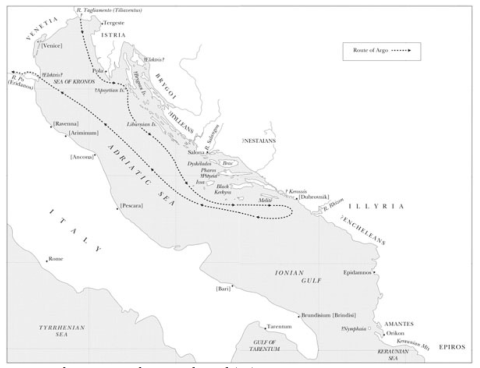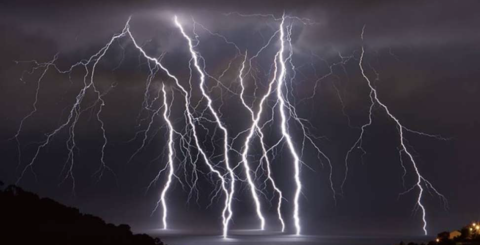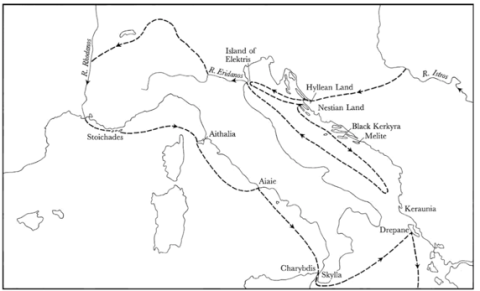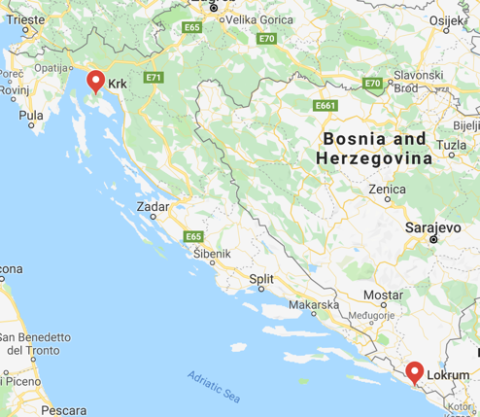οἱ δ᾽ ἄμυδις πυρσοῖο σέλας προπάροιθεν ἰδόντες,
τό σφιν παρθενικὴ τέκμαρ μετιοῦσιν ἄειρεν,
Κολχίδος ἀγχόθι νηὸς ἑὴν παρὰ νῆ᾽ ἐβάλοντο
ἥρωες: Κόλχον δ᾽ ὄλεκον στόλον, ἠύτε κίρκοι485
φῦλα πελειάων, ἠὲ μέγα πῶυ λέοντες
ἀγρότεροι κλονέουσιν ἐνὶ σταθμοῖσι θορόντες.
οὐδ᾽ ἄρα τις κείνων θάνατον φύγε, πάντα δ᾽ ὅμιλον
πῦρ ἅ τε δηιόωντες ἐπέδραμον: ὀψὲ δ᾽ Ἰήσων
ἤντησεν, μεμαὼς ἐπαμυνέμεν οὐ μάλ᾽ ἀρωγῆς490
δευομένοις: ἤδη δὲ καὶ ἀμφ᾽ αὐτοῖο μέλοντο.
ἔνθα δὲ ναυτιλίης πυκινὴν περὶ μητιάασκον
ἑζόμενοι βουλήν: ἐπὶ δέ σφισιν ἤλυθε κούρη
φραζομένοις: Πηλεὺς δὲ παροίτατος ἔκφατο μῦθον:
ἤδη νῦν κέλομαι νύκτωρ ἔτι νῆ᾽ ἐπιβάντας495
εἰρεσίῃ περάαν πλόον ἀντίον, ᾧ ἐπέχουσιν
δήιοι: ἠῶθεν γὰρ ἐπαθρήσαντας ἕκαστα
ἔλπομαι οὐχ ἕνα μῦθον, ὅτις προτέρωσε δίεσθαι
ἡμέας ὀτρυνέει, τοὺς πεισέμεν: οἷα δ᾽ ἄνακτος
εὔνιδες, ἀργαλέῃσι διχοστασίῃς κεδόωνται.500
ῥηιδίη δέ κεν ἄμμι, κεδασθέντων δίχα λαῶν,
ἤ τ᾽ εἴη μετέπειτα κατερχομένοισι κέλευθος.
ὧς ἔφατ᾽: ᾔνησαν δὲ νέοι ἔπος Λἰακίδαο.
ῥίμφα δὲ νῆ᾽ ἐπιβάντες ἐπερρώοντ᾽ ἐλάτῃσιν
νωλεμές, ὄφρ᾽ ἱερὴν Ἠλεκτρίδα νῆσον ἵκοντο,505
ἀλλάων ὑπάτην, ποταμοῦ σχεδὸν Ἠριδανοῖο.
Κόλχοι δ᾽ ὁππότ᾽ ὄλεθρον ἐπεφράσθησαν ἄνακτος,
ἤτοι μὲν δίζεσθαι ἐπέχραον ἔνδοθι πάσης
Ἀργὼ καὶ Μινύας Κρονίης ἁλός. ἀλλ᾽ ἀπέρυκεν
Ἥρη σμερδαλέῃσι κατ᾽ αἰθέρος ἀστεροπῇσιν.510
ὕστατον αὖ (δὴ γάρ τε Κυταιίδος ἤθεα γαίης
στύξαν, ἀτυζόμενοι χόλον ἄγριον Αἰήταο),
ἔμπεδα δ᾽ ἄλλυδις ἄλλοι ἐφορμηθέντες ἔνασθεν.
οἱ μὲν ἐπ᾽ αὐτάων νήσων ἔβαν, ᾗσιν ἐπέσχον
ἥρωες, ναίουσι δ᾽ ἐπώνυμοι Ἀψύρτοιο:515
οἱ δ᾽ ἄρ᾽ ἐπ᾽ Ἰλλυρικοῖο μελαμβαθέος ποταμοῖο,
τύμβος ἵν᾽ Ἁρμονίης Κάδμοιό τε, πύργον ἔδειμαν,
ἀνδράσιν Ἐγχελέεσσιν ἐφέστιοι: οἱ δ᾽ ἐν ὄρεσσιν
ἐνναίουσιν, ἅπερ τε Κεραύνια κικλήσκονται,
ἐκ τόθεν, ἐξότε τούσγε Διὸς Κρονίδαο κεραυνοὶ520
νῆσον ἐς ἀντιπέραιαν ἀπέτραπον ὁρμηθῆναι.
ἥρωες δ᾽, ὅτε δή σφιν ἐείσατο νόστος ἀπήμων,
δή ῥα τότε προμολόντες ἐπὶ χθονὶ πείσματ᾽ ἔδησαν
Ὑλλήων. νῆσοι γὰρ ἐπιπρούχοντο θαμειαὶ
ἀργαλέην πλώουσιν ὁδὸν μεσσηγὺς ἔχουσαι525
οὐδέ σφιν, ὡς καὶ πρίν, ἀνάρσια μητιάασκον
Ὑλλῆες: πρὸς δ᾽ αὐτοὶ ἐμηχανόωντο κέλευθον,
μισθὸν ἀειρόμενοι τρίποδα μέγαν Ἀπόλλωνος.
δοιοὺς γὰρ τρίποδας τηλοῦ πόρε Φοῖβος ἄγεσθαι
Αἰσονίδῃ περόωντι κατὰ χρέος, ὁππότε Πυθὼ530
ἱρὴν πευσόμενος μετεκίαθε τῆσδ᾽ ὑπὲρ αὐτῆς
ναυτιλίης: πέπρωτο δ᾽, ὅπῃ χθονὸς ἱδρυνθεῖεν,
μήποτε τὴν δῄοισιν ἀναστήσεσθαι ἰοῦσιν.
τούνεκεν εἰσέτι νῦν κείνῃ ὅδε κεύθεται αἴῃ
ἀμφὶ πόλιν ἀγανὴν Ὑλληίδα, πολλὸν ἔνερθεν535
οὔδεος, ὥς κεν ἄφαντος ἀεὶ μερόπεσσι πέλοιτο.
οὐ μὲν ἔτι ζώοντα καταυτόθι τέτμον ἄνακτα
Ὕλλον, ὃν εὐειδὴς Μελίτη τέκεν Ἡρακλῆι
δήμῳ Φαιήκων. ὁ γὰρ οἰκία Ναυσιθόοιο
Μάκριν τ᾽ εἰσαφίκανε, Διωνύσοιο τιθήνην,540
νιψόμενος παίδων ὀλοὸν φόνον: ἔνθ᾽ ὅγε κούρην
Αἰγαίου ἐδάμασσεν ἐρασσάμενος ποταμοῖο,
νηιάδα Μελίτην: ἡ δὲ σθεναρὸν τέκεν Ὕλλον.
οὐδ᾽ ἄρ᾽ ὅγ᾽ ἡβήσας αὐτῇ ἐνὶ ἔλδετο νήσῳ
ναίειν, κοιρανέοντος ὑπ᾽ ὀφρύσι Ναυσιθόοιο:
βῆ δ᾽ ἅλαδε Κρονίην, αὐτόχθονα λαὸν ἀγείρας
Φαιήκων: σὺν γάρ οἱ ἄναξ πόρσυνε κέλευθον
ἥρως Ναυσίθοος: τόθι δ᾽ εἵσατο, καί μιν ἔπεφνον550
Μέντορες, ἀγραύλοισιν ἀλεξόμενον περὶ βουσίν.
notes
vocabulary
ἄμυδις, together, at the same time
πυρσός, a firebrand, torch
σέλας τό, a bright flame, blaze, light
προπάροιθε, before, in front of
τέκμαρ, a fixed mark
ἀγχόθι, near
Κόλχος ὁ, a Colchian 485
ὀλέκω, to ruin, destroy, kill
στόλος -ου ὁ, expedition
ἠύτε, as, like as
κίρκος ὁ, hawk
φῦλον τό, flock, tribe
πελειάς ἡ, dove
πῶυ τό, a flock
ἀγρότερος, wild
κλονέω, to drive in confusion, drive before one
σταθμός ὁ, a fold
θρῴσκω, to leap, spring
θάνατος -ου ὁ, death
φεύγω φεύξομαι ἔφυγον πέφευγα --- ---, flee
ὅμιλος -ου ὁ, group, crowd
δηιόω, to cut down, slay
ἐπιτρέχω, to run upon, attack
ὀψέ, late
ἀντάω, to encounter, meet with, join 490
μάω, be eager, press on
ἐπαμύνω, to come to aid, defend, assist
ἀρωγή, help, aid, succour, protection
δεύω to miss, want
μέλω, μέλομαι, be an object of care or interest
ναυτιλίη ἡ, voyage
πυκινός, wise
μητιάω, to meditate, deliberate, debate
ἕζομαι, sit down
φράζω φράσω ἔφρασα πέφρακα πέφρασμαι ἐφράσθην, advise, design
Πηλεύς ὁ, Peleus (Νame)
παροίτατος, first of all
ἔκφημι, to speak out
κέλομαι, command, urge on, exhort, call to 495
νύκτωρ, by night
εἰρεσίη ἡ, rowing
περάω περάσω (or περῶ) ἐπέρασα πεπέρακα --- ---, to cross, row
πλόος ὁ, a sailing, voyage
ἀντίον, opposite, over against
ἐπέχω, control
δήιος, hostile, pl. the enemy
ἠῶθεν, at dawn, in the morning
ἐπαθρέω, discover
προτέρωσε, toward the front, forward
δίεμαι, to pursue
ὀτρύνω, urge on, encourage
πείθω πείσω ἔπεισα πέπεικα (or πέποιθα) πέπεισμαι ἐπείσθην, persuade
ἄναξ -ακτος ὁ, ruler, lord
εὖνις, deprived of 500
ἀργαλέος -α, -ον, hard to endure or deal with, difficult
διχοστασίη ἡ, dissension
κεδάννυμι, to break asunder, break up, scatter
ῥηΐδιος, η, ον, easy
δίχα, apart
λαός -οῦ ὁ, people, host
κατέρχομαι, to go down from, return
κέλευθος ὁ, a road, way, path, track
αἰνέω αἰνέσω ᾔνεσα ᾔνεκα ᾔνημαι ᾔνέθην, praise
Αἰακίδης, son of Aeacus i.e. Peleus
ῥίμφα, lightly, swiftly, fleetly
ἐπιρρώομαι, to row, to work vigorously at something.
ἐλάτη, ἡ, an oar
νωλεμές, without pause, unceasingly, continually 505
Ἠλεκτρίς, of Electra, name of a group of islands in the Adriatic
νῆσος -ου ἡ, island
ὕπατος -η -ον, highest, the top of
σχεδόν, near, almost
Ἠριδανός, Eridanus (River)
ὁππότε, when
ὄλεθρος, ruin, destruction, death
ἐπιφράζω, to notice, observe
δίζημαι, to seek out, look for
ἐπιχράω, to rage, to be urgent or eager to do
Μινύαι, the Minyans
Κρόνιος, Saturnian, of Cronus
ἀπερύκω, to keep off
Ἥρη ἡ, Hera
σμερδαλέος, terrible, fearful 510
αἰθήρ ἡ, ether, the sky
ἀστεροπή ἡ, lightning
ὕστατος -η -ον, latest, last
Κυταιίς -ίδος, ἡ, Kytaian, Colchian (Name)
ἦθος -ους τό, home, haunt
στυγέω, hate
ἀτύζομαι, to be distraught from fear, bewildered
χόλος -ου ὁ, anger
ἄγριος -α -ον, savage; wild; fierce
ἔμπεδον, lasting, continual
ἄλλυδις, elsewhere
ἀφορμάω, to make start from, set off
ναίω, dwell, inhabit, be situated
ἐπέχω ἐφέξω ἐπέσχον ἐπέσχηκα --- ---, go on to, οψψθπυ.
ἐπώνυμος, given as a name 515
Ἰλλυρικός, ή, όν, Illyrian
μελαμβαθής, black and deep
τύμβος ὁ, a sepulchral mound, cairn, barrow
Ἁρμονί-ας, ἡ, Harmonia (Name)
Κάδμος, Cadmus (Name)
πύργος -ου ὁ, fortress, fortified town, tower
δέμω, to build
Ἐγχελεῖς -εῶν, οἱ, Enchelees (Name)
ἐφέστιος, dwelling with, at one's own fireside, at home
ἐνναίω, to dwell in
Κεραύνιος, of a thunderbolt, Ceraunian
κικλήσκω, to call, summon
τόθεν, hence, thence 520
ἐξότε, from the time when
Κρονίδης ὁ, son of Cronus
κεραυνός ὁ, a thunderbolt
ἀντιπέραιος, α, ον, lying over against
ἀποτρέπω, to turn
ὁρμάω ὁρμήσω ὥρμησα ὥρμηκα ὥρμημαι ὡρμήθην, start, travel to
εἴδομαι, are visible, appear
ἀπήμων, safe, without harm
προβλώσκω, to go onwards
πεῖσμα τό, a ship's cable
δέω δήσω ἔδησα δέδεκα δέδεμαι ἐδέθην, bind, fetter
Ὑλλήες - οἱ, Hylloi/Hyllees (name)
ἐπιπροέχομαι, stand forward, project
θαμέες, crowded, close-set, thick
ἀργᾰλέος -α, -ον, difficult 525
πλέω πλεύσομαι ἔπλευσα πέπλευκα --- ---, sail, go by sea
μεσσηγὺς, in the middle, between
ἀνάρσιος, hostile, inplacable
μητιάω, to plan
μηχανάομαι, contrive, plan
κέλευθος ὁ, a road, way, path, track
μισθός -οῦ ὁ, wages, pay, hire
ἀείρω, to lift, heave, raise up
τρίπους ὁ, tripod
Ἀπόλλων ὁ, Apollo
δοιοί, two, both
τηλοῦ, afar, far off
πόρω, pres. not attested; aor. to furnish, offer, present
Φοῖβος ὁ, Phoebus
περάω περάσω (or περῶ) ἐπέρασα πεπέρακα --- ---, to pass through, journey 530
χρέος, an obligation, debt, mission
ὁππότε, when
Πυθώ ἡ, Pytho, the region of Delphi
μετακιάθω, to follow after
ὅπῃ, wherever
χθών χθονός ἡ, the earth, ground
ἱδρύω ἱδρύσω ἵδυρσα ἵδρυκα ἵδρυμαι ἱδρύθην, make sit down, seat
ἀνίστημι ἀνστήσω ἀνέστησα (or ἀνέστην), to be made to emigrate
τοὔνεκα, for that reason, therefore
εἰσέτι, still yet
κεύθω, to cover quite up, to cover, hide
ἀγανός, mild, gentle, kindly (see notes) 535
Ὑλληίς -ίδος, ἡ, Hylle (name)
ἔνερθε, beneath
οὖδας, the surface of the earth, the ground, earth
ἄφαντος, invisible, hidden
μέροψ, mortal (men)
καταυτόθι, in that place
τέτμον, find, come upon (Ep. aor. without any pres. in use)
Ὕλλος ὁ, Hyllus (name: see notes)
εὐειδής, beautiful, fair
Μελίτη ἡ, Melite
τίκτω τέξομαι ἔτεκον τέτοκα --- ---, beget, bear
Ἡρακλέης ὁ, Heracles
δῆμος -ου ὁ, common people, district
Φαίηξ, ηκος, ὁ, Phaeacian
οἰκίον τό, house, palace (always plural)
Ναυσίθοος ὁ, Nausithous
Μάκρις, ἡ, Makris (name) 540
Διώνυσος ὁ, Ep. for Διονυσος
τιθήνη ἡ, a nurse
νίζω, to wash the hands, cleanse from murder.
ὀλοός, destructive, fatal, deadly
φόνος -ου ὁ, murder, slaughter, corpse
Αἰγαῖος, Aegaeos (a river)
δαμάζω, to force, seduce
ἐράω, love, be in love with
Ναϊάς ἡ, Naiad, river-nymph, spring-nymph
Μελίτη ἡ, Melite (Νame)
σθεναρός, strong, mighty
τίκτω τέξομαι ἔτεκον τέτοκα --- ---, beget, bear
ἡβάω, to grow up
ἔλδομαι, to wish, long
κοιρανέω, to be lord 545
ὀφρύς ἡ, the brow, eyebrow
ὑπ᾿ ὀφρύσι, under the haughty gaze of
Ναυσίθοος, Nausithous (Νame)
Κρόνιος, Saturnian, of Cronus
αὐτόχθων, sprung from the land itself
λαός -οῦ ὁ, people, host
ἀγείρω ἤγειρα ἀγήγερμαι ἠγέρθην, gather, collect
πορσύνω, to offer, present
Ναυσίθοος ὁ, Nausithous 550
τόθι, there, in that place
ἵζω, to settle
θείνω, to strike, wound
Μέντορες, Mentores (an Illyrian tribe)
ἄγραυλος, dwelling in the field
ἀλέξω, to defend





